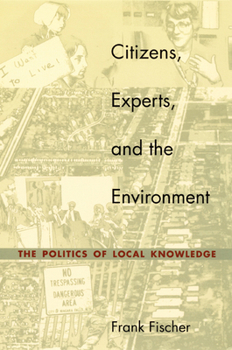Citizens, Experts, and the Environment: The Politics of Local Knowledge
Select Format
Select Condition 
Book Overview
The tension between professional expertise and democratic governance has become increasingly significant in Western politics. Environmental politics in particular is a hotbed for citizens who actively challenge the imposition of expert theories that ignore forms of local knowledge that can help to relate technical facts to social values.
Where information ideologues see the modern increase in information as capable of making everyone smarter, others see the emergence of a society divided between those with and those without knowledge. Suggesting realistic strategies to bridge this divide, Fischer calls for meaningful nonexpert involvement in policymaking and shows how the deliberations of ordinary citizens can help solve complex social and environmental problems by contributing local contextual knowledge to the professionals' expertise. While incorporating theoretical critiques of positivism and methodology, he also offers hard evidence to demonstrate that the ordinary citizen is capable of a great deal more participation than is generally recognized. Popular epidemiology in the United States, the Danish consensus conference, and participatory resource mapping in India serve as examples of the type of inquiry he proposes, showing how the local knowledge of citizens is invaluable to policy formation. In his conclusion Fischer examines the implications of the approach for participatory democracy and the democratization of contemporary deliberative structures.
This study will interest political scientists, public policy practitioners, sociologists, scientists, environmentalists, political activists, urban planners, and public administrators along with those interested in understanding the relationship between democracy and science in a modern technological society.
Where information ideologues see the modern increase in information as capable of making everyone smarter, others see the emergence of a society divided between those with and those without knowledge. Suggesting realistic strategies to bridge this divide, Fischer calls for meaningful nonexpert involvement in policymaking and shows how the deliberations of ordinary citizens can help solve complex social and environmental problems by contributing local contextual knowledge to the professionals' expertise. While incorporating theoretical critiques of positivism and methodology, he also offers hard evidence to demonstrate that the ordinary citizen is capable of a great deal more participation than is generally recognized. Popular epidemiology in the United States, the Danish consensus conference, and participatory resource mapping in India serve as examples of the type of inquiry he proposes, showing how the local knowledge of citizens is invaluable to policy formation. In his conclusion Fischer examines the implications of the approach for participatory democracy and the democratization of contemporary deliberative structures.
This study will interest political scientists, public policy practitioners, sociologists, scientists, environmentalists, political activists, urban planners, and public administrators along with those interested in understanding the relationship between democracy and science in a modern technological society.
Format:Paperback
Language:English
ISBN:0822326221
ISBN13:9780822326229
Release Date:December 2000
Publisher:Duke University Press
Length:352 Pages
Weight:1.25 lbs.
Dimensions:0.9" x 6.1" x 9.2"
Customer Reviews
1 rating
An excellent resource
Published by Thriftbooks.com User , 17 years ago
Wow, this book is really a must-read for those studying environmental policy. First, Fischer does a really good job of explaining the interface between science and policy-making. He reminds us that policies are first and foremost political and social constructions, and while science can play a role in informing policies, there are many other things that are priorities for different groups of people. He also does a good job of explaining the link between science and advocacy groups, as well as explaining how NIMBY (not in my backyard) situations arise and how incorporation of different kinds of knowledge, even that which scientists consider 'irrational', is essential in formulating viable environmental policies. Through this process, Fischer also forces us to rethink the way in which the typical roles of 'experts' and 'citizens' are cast. I read this book while starting to write my thesis on water policy, and it made a huge difference in the way I thought about the results from my own research. Had I not read it, my results would have made a lot less sense, and my recommendations for further action would have been virtually nonexistent. In all honesty, I have a really hard time succinctly summarizing this book because it covers so much ground, but it is surprisingly quite readable and really helps one to begin to make some sense out of how we might better strengthen ties between the public and experts in a way that redemocratizes knowledge production and use.





